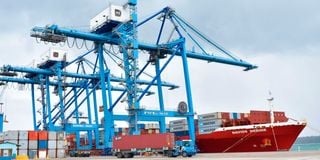Cost burden as KRA cargo order returns small traders to Mombasa port

Panama-flagged container ship Lisa offloads cargo at the newly constructed container Terminal 2 at the port of Mombasa in June last year.
Small traders importing products together will now be forced to collect them at the point of entry, including the port of Mombasa, following a policy shift by the Kenya Revenue Authority (KRA), adding a layer of logistics cost that is likely to be passed onto consumers.
The small traders have been operating through a cargo consolidation arrangement where small shipments are combined to lessen shipping hassles, resulting in lower costs and fast transport. Each trader collects his or her goods at the final destination, where the container is de-consolidated.
Since 2021, consolidated cargo at the Port of Mombasa destined for Nairobi was moved, de-consolidated, cleared and the goods made available for collection at the Boma Line shed.
With the new changes that take effect this month, such traders will have to de-consolidate their cargo at any of the points of entry including, Mombasa port to comply with international law.
“It is important to note that undeclared/concealed items are assessed and subjected to additional taxes. KRA continues to address issues of concealment and undeclared items through Ports of entry to ensure everyone pays their fair share of taxes,” it said.
The small traders have been paying $1,000 (about Sh127,800 at the current exchange rate) per container, which reduced the cost of doing business.
The taxman plans to start opening containers to compute taxes item by item, which will hit small traders who pay taxes per kilogramme.
According to KRA, the decision to move to the new model after traders abused the initial government directive aimed at easing costs for small importers.





